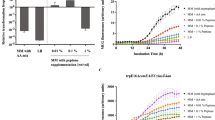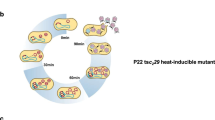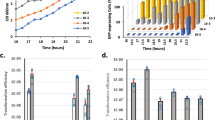Abstract
In bacterial genetic transformation the uptake of DNA and its integration into the resident chromosome is dependent on a special cellular state, termed competence. In those species where appearance of competence has been studied, specific (but often poorly defined) growth conditions lead to a simultaneous development of competence in a substantial fraction of the cells in a culture. In Bacillus subtilis1–4, and in Haemophilus species5,6, competence appears in the stationary phase of growth or in certain other growth-limiting conditions5,6. Streptococcus pneumoniae (pneumococcus) is perhaps unusual in that virtually all cells of a culture become competent7,8, for a short period at a specific cell density during logarithmic growth, without perturbing the growth rate9. The synchronous appearance of competence in pneumococcal cultures results from an auto-catalytic effect of a small protein10 released by the cells that induces competence11,12. The response to competence factor has been shown to require protein synthesis13. We report here additional information on the nature of competence in pneumococcus: pulse-labelling studies show that for the brief period of competence protein synthesis is restricted to a few specific polypeptides.
This is a preview of subscription content, access via your institution
Access options
Subscribe to this journal
Receive 51 print issues and online access
$199.00 per year
only $3.90 per issue
Buy this article
- Purchase on Springer Link
- Instant access to full article PDF
Prices may be subject to local taxes which are calculated during checkout
Similar content being viewed by others
References
Nester, E. W. J. Bact. 87, 867–875 (1964).
Bott, K. F. & Wilson, G. A. Bact. Rev. 32, 370–378 (1968).
Wilson, G. A. & Bott, K. F. J. Bact. 95, 1439–1449 (1968).
Dooley, D. C., Hadden, C. T. & Nester, E. W. J. Bact. 108, 668–679 (1971).
Goodgal, S. & Herriott, R. M. J. gen. Physiol. 44, 1201–1227 (1961).
Spencer, H. T. & Herriott, R. M. J. Bact. 90, 911–920 (1965).
Javor, G. T. & Tomasz, A., Proc. natn. Acad. Sci. U.S.A. 68, 1216–1222 (1968).
Porter, R. D. & Guild, W. R. J. Bact. 97, 1033–1035 (1969).
Tomasz, A. Nature 208, 155 (1965).
Tomasz, A. & Mosser, J. L. Proc. natn. Acad. Sci. U.S.A. 55, 58–66 (1966).
Tomasz, A. & Hotchkiss, R. D. Proc. natn. Acad. Sci. U.S.A. 51, 480–487 (1964).
Seto, H. & Tomasz, A. J. Bact. 121, 344–353 (1975).
Tomasz, A. & Beiser, S. M. J. Bact. 90, 1226–1232 (1965).
Morrison, D. A. J. Bact. 136, 548–557 (1978).
Morrison, D. A., Baker, M. & Mannarelli, B. in Transformation 1978 (eds Glover, S. W. & Butler, L. O.) (Cotswold, Oxford, 1978).
Morrison, D. A. J. Bact. 132, 576–583 (1977).
Laemmli, U. K. Nature 227, 680–685 (1970).
Laskey, R. A. & Mills, A. D. Eur. J. Biochem. 56, 335–341 (1975).
Lacks, S. J. Bact. 101, 373–383 (1970).
Author information
Authors and Affiliations
Rights and permissions
About this article
Cite this article
Morrison, D., Baker, M. Competence for genetic transformation in pneumococcus depends on synthesis of a small set of proteins. Nature 282, 215–217 (1979). https://doi.org/10.1038/282215a0
Received:
Accepted:
Issue Date:
DOI: https://doi.org/10.1038/282215a0
This article is cited by
-
A positive feedback loop mediated by Sigma X enhances expression of the streptococcal regulator ComR
Scientific Reports (2017)
-
Instability of pneumococcus library in pHC79 and pACYC184
Archives of Pharmacal Research (1995)
-
Characterization of several transformation-deficient mutants ofStreptococcus pneumoniae in DNA damage
Archives of Pharmacal Research (1995)
-
Heterospecific transformation in Bacillus subtilis: protein composition of a membrane-DNA complex containing unstable heterologous donor-recipient complex
Molecular and General Genetics MGG (1984)
-
Genetic transformation in bacteria
Journal of Biosciences (1984)
Comments
By submitting a comment you agree to abide by our Terms and Community Guidelines. If you find something abusive or that does not comply with our terms or guidelines please flag it as inappropriate.



